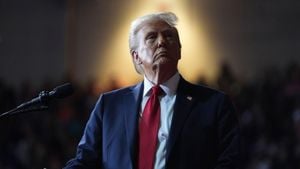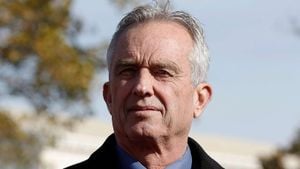Vice President Kamala Harris's recent presidential campaign has stirred waves of conversation, especially concerning her choices and the direction of Democratic Party strategies. After losing to President-elect Donald Trump, various analyses are surfacing about what went wrong and who might have made the cut to complement her run.
One of the most pointed critiques focuses on her choice of running mate. Exit polls indicate Harris's decision to overlook Pennsylvania Governor Josh Shapiro for Minnesota Gov. Tim Walz significantly impacted her support from Jewish voters. According to data gathered by the Honan Strategy Group for the Teach Coalition, had Harris opted for Shapiro, whom many view as a moderate and reliable ally to the Jewish community, she could have secured 53 percent of the Jewish vote compared to Walz's meager 41 percent.
Shapiro's backing of Israel and his charismatic oratory made him more than just another politician; he was seen as the type of figure who could rally support among Jewish Americans. His failure to be included on Harris's ticket incited surprise and raised eyebrows within the Democratic Party—suggesting perhaps a rift between party establishment preferences and broader voter sentiments.
Throughout her campaign, Harris reportedly faced accusations of being soft on antisemitism, raising questions about her alignment with Jewish values and pro-Israel policies. Shapiro, who fervently defended Israel during the recent conflict with Hamas, seemed like the perfect antidote to such controversies. According to observers, had Harris featured Shapiro on her ticket, he may have helped mitigate these accusations and bolster her standing among Jewish voters at a time of heightened sensitivity.
Critics who followed the campaign closely also noted how Shapiro’s passionate stand against anti-Israel rhetoric, as evidenced by his condemnation of anti-Israel protests, contrasted sharply with the sensitivity Democrats show toward the far-left faction of their party. His rhetoric, which some have characterized as brash when he called out anti-Israel demonstrations with stern warnings about their similarities to KKK gatherings, exists as both his charm and, intriguingly, his Achilles heel within the party.
Then-candidate Donald Trump seized the opportunity to weaponize this oversight. He suggested Harris's decision to sidestep Shapiro was based on his Jewish identity and the potential backlash she feared from Muslim voters within influence-heavy swing states like Michigan. Such accusations set the tone for Trump's campaign strategy, framing Harris’s administration as one fearful and disengaged from the communities it was meant to serve.
Compounding Harris’s challenges were her struggles to connect authentically with Latino and working-class voters, segments of the electorate she desperately needed to engage. Reports from various precincts, particularly those with sizable Latino populations, revealed troubling trends compared to the 2020 election. This year's exit polls indicated Trump's favors among Latino voters increased to about 45 percent, the highest for any Republican candidate since George W. Bush, which undoubtedly raised alarms for the Democratic establishment.
Notably, voters expressed dissatisfaction with traditional Democratic messaging, which they perceived as increasingly out of touch with issues they deemed necessary—predominantly the economy and personal security. According to Leticia Cruz, a resident from Chicago’s Little Village neighborhood, "I felt like Kamala made sense, but sometimes it felt like she wasn’t sure what she was talking about." Her sentiments echoed across numerous precincts where Democrats saw slippage.
The leftward move of the Democratic Party compounded with these electoral losses signals potential ramifications heading toward the 2028 elections. Analysts speculate how these dynamics might reshape who emerges as contenders, overshadowing traditional choices with more unorthodox candidates who can resonate with the working-class base. Some theorize about individuals like U.S. Representative Ruben Gallego, who has positioned himself as capable of connecting deeply with voters, particularly among those disaffected by the prevailing political discourse.
Party strategists and political commentators suggest this could lead to potential candidacies from figures who diverge significantly from the norm—individuals who may not fit the stereotypical mold of seasoned politicians, aiming instead to curate messages steeped in real-world experience and relatability. The election results could prompt candidates with less conventional tracks, who have the potential to bring fresh perspectives to stagnant issues and reinvigorate Democratic outreach to marginalized communities.
The aftermath of the election also invites discussions about the implicit biases haunting the Democratic Party. The historical trend of political narratives often defaulting to traditional, established figures leaves many questioning whether these appointments reflect the electorate’s needs or merely party loyalty. The upcoming political climate may necessitate candidates with the emotional intelligence and innovative approaches to widen their appeal beyond entrenched bases.
Looking at Harris's experience, the sentiment remains fairly consistent: the political stage demands agility and authenticity, attributes which many believe should guide the party’s choices moving forward. Many see this as the moment to redefine political outreach strategies, aligning them more authentically with voter needs and cultural contexts so often overlooked.
Now, as the Democratic Party braces for the challenges of future elections, the lessons learned from Kamala Harris’s campaign could hold significant weight. The choice of running mate, the ability to authentically engage with constituents, and the orientation of the party’s messaging will be pivotal. Whether the Democrats can adapt to these lessons remains to be seen as they navigate the unknown waters of the upcoming electoral tide.



